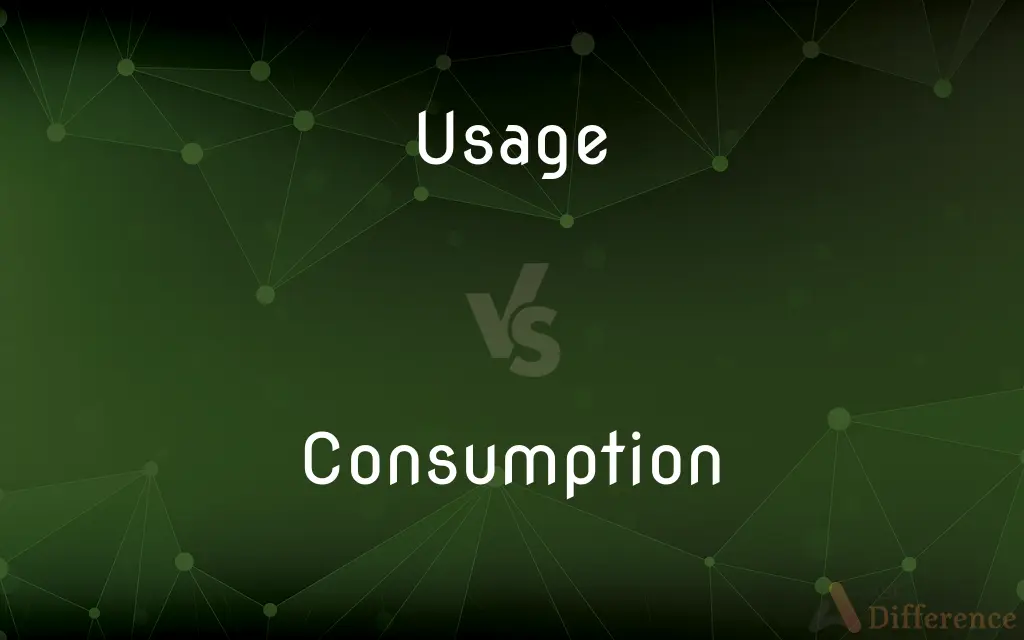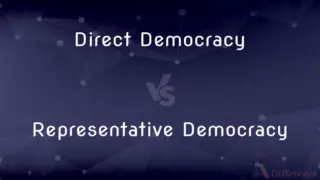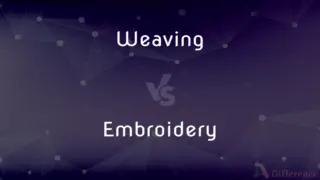Usage vs. Consumption — What's the Difference?
By Maham Liaqat & Fiza Rafique — Published on February 26, 2024
Usage refers to the manner in which something is used, often implying functionality or application, while consumption denotes the act of using up a resource, typically associated with depletion or expenditure.

Difference Between Usage and Consumption
Table of Contents
ADVERTISEMENT
Key Differences
Usage encompasses the ways in which an item, service, or resource is utilized, highlighting the methods, purposes, or contexts of its application. It's a broad term that can refer to both the act of using something and the customary practices associated with its use. For instance, the usage of a software program involves not only operating the software but also adhering to best practices and guidelines for its effective application.
Consumption, on the other hand, specifically implies the act of consuming or using up resources, goods, or services, often leading to a decrease in their availability. It is closely associated with economic and environmental contexts, where it denotes the expenditure of resources, such as energy consumption or the consumption of consumer goods. Consumption inherently carries the notion of depletion, suggesting that the consumed item is diminished or exhausted as a result.
In the context of products and services, usage can be seen as the broader term that includes how and why something is employed, without necessarily implying its reduction or exhaustion. Consumption narrows this down to the aspect of usage that leads to the diminishment of the item or resource in question. For example, the usage of a public park includes activities like walking, picnicking, and playing sports, while the consumption of the park's resources might refer to the wear and tear of facilities or the use of water and energy for maintenance.
The distinction also plays a significant role in discussions about sustainability and environmental impact. Usage patterns can be analyzed to improve efficiency and reduce waste, whereas managing consumption often focuses on decreasing the amount of resources used and mitigating the negative impacts on the environment.
Both terms are sometimes used interchangeably in casual conversation, but their nuances become important in technical, environmental, and economic discussions, where the difference between how something is used (usage) and the implications of its use (consumption) can lead to different analyses and conclusions.
ADVERTISEMENT
Comparison Chart
Definition
How something is employed or applied
The act of using up a resource
Focus
Functionality, application
Depletion, expenditure
Context
Broad, general usage
Economic, environmental impact
Implication
Can be neutral or positive
Often implies reduction or loss
Measurement
Can be qualitative or quantitative
Primarily quantitative
Compare with Definitions
Usage
The manner in which something is used.
The usage of renewable energy sources is on the rise.
Consumption
The act of using up resources or goods.
The country's consumption of fossil fuels has decreased due to new policies.
Usage
The application of a method or tool.
The software's usage is restricted to licensed users.
Consumption
The economic process of buying and using goods and services.
Consumer consumption patterns shift during economic downturns.
Usage
Customary or accepted practices.
Language usage evolves over time.
Consumption
The amount of something that is consumed.
Annual energy consumption statistics help gauge efficiency trends.
Usage
The operation or employment of something.
Water usage in agriculture is a critical concern.
Consumption
The utilization of services or products leading to depletion.
Increased consumption of single-use plastics is an environmental issue.
Usage
The extent to which a product or service is used.
Smartphone usage has increased dramatically over the past decade.
Consumption
The exhaustive use of a resource.
The project led to the rapid consumption of available funds.
Usage
The act of using; mode of using or treating; treatment; conduct with respect to a person or a thing; as, good usage; ill usage; hard usage.
My brotherIs prisoner to the bishop here, at whose handsHe hath good usage and great liberty.
Consumption
The state of being consumed.
Usage
The act, manner, or amount of using; use.
Patterns of computer usage.
An instrument that measures water usage.
Consumption
The act or process of consuming by use, waste, etc.; decay; destruction.
Every new advance of the price to the consumer is a new incentive to him to retrench the quality of his consumption.
Consumption
The act or process of consuming.
Consumption
The act of consuming something.
Common Curiosities
How do changes in technology affect usage and consumption?
Technological advances can alter usage patterns (e.g., more efficient use) and reduce consumption (e.g., lower energy use per device).
Can "usage" and "consumption" be used interchangeably?
While they are sometimes used interchangeably in everyday language, they have distinct meanings, especially in technical or specialized contexts.
Is "usage" always positive and "consumption" always negative?
Not necessarily. "Usage" can be neutral or positive, focusing on functionality, while "consumption" often implies depletion but is a normal aspect of economic activity.
Why is it important to differentiate between usage and consumption in environmental studies?
Distinguishing between them helps identify opportunities for improving efficiency (usage) and reducing resource depletion (consumption).
How does energy usage differ from energy consumption?
Energy usage refers to how energy is used (e.g., heating, lighting), while energy consumption measures the quantity of energy used up.
How do companies measure product usage and consumption?
Product usage might be measured in user engagement or frequency of use, while consumption could be quantified in units sold or resources depleted.
Can policy changes impact consumption without affecting usage?
Yes, policies can target consumption levels (e.g., through taxes or subsidies) without changing the manner in which a resource or product is used.
How do seasonal changes affect usage and consumption?
Seasonal variations can significantly impact both, such as increased energy usage and consumption for heating or cooling.
Why is understanding water usage and consumption important?
Analyzing water usage helps improve efficiency and conservation, while understanding consumption is crucial for managing supply and sustainability.
What strategies can reduce consumption without compromising usage?
Implementing efficiency measures, recycling, and using renewable resources can reduce consumption while maintaining or even enhancing usage.
What role does consumer behavior play in usage and consumption?
Consumer behavior greatly influences both usage (how products are used) and consumption (the amount of resources used or depleted).
How does digital consumption differ from physical consumption?
Digital consumption involves resources like bandwidth and electricity, whereas physical consumption involves tangible goods and materials.
Can improving usage efficiency lead to a decrease in overall consumption?
Yes, more efficient usage of resources can result in lower overall consumption, benefiting both the economy and the environment.
How do educational initiatives impact usage and consumption patterns?
Education can promote more informed and responsible usage and consumption habits, contributing to sustainability and conservation efforts.
Can usage lead to increased consumption?
Yes, increased usage of a resource or product can lead to higher consumption, especially if not managed efficiently.
Share Your Discovery

Previous Comparison
Direct Democracy vs. Representative Democracy
Next Comparison
Weaving vs. EmbroideryAuthor Spotlight
Written by
Maham LiaqatCo-written by
Fiza RafiqueFiza Rafique is a skilled content writer at AskDifference.com, where she meticulously refines and enhances written pieces. Drawing from her vast editorial expertise, Fiza ensures clarity, accuracy, and precision in every article. Passionate about language, she continually seeks to elevate the quality of content for readers worldwide.
















































